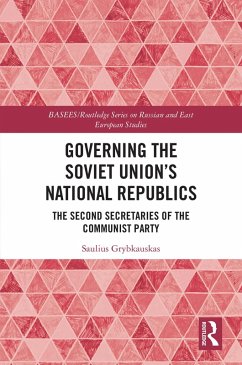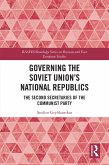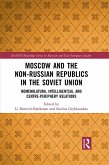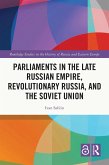Saulius Grybkauskas
Governing the Soviet Union's National Republics (eBook, ePUB)
The Second Secretaries of the Communist Party
42,95 €
42,95 €
inkl. MwSt.
Sofort per Download lieferbar

21 °P sammeln
42,95 €
Als Download kaufen

42,95 €
inkl. MwSt.
Sofort per Download lieferbar

21 °P sammeln
Jetzt verschenken
Alle Infos zum eBook verschenken
42,95 €
inkl. MwSt.
Sofort per Download lieferbar
Alle Infos zum eBook verschenken

21 °P sammeln
Saulius Grybkauskas
Governing the Soviet Union's National Republics (eBook, ePUB)
The Second Secretaries of the Communist Party
- Format: ePub
- Merkliste
- Auf die Merkliste
- Bewerten Bewerten
- Teilen
- Produkt teilen
- Produkterinnerung
- Produkterinnerung

Bitte loggen Sie sich zunächst in Ihr Kundenkonto ein oder registrieren Sie sich bei
bücher.de, um das eBook-Abo tolino select nutzen zu können.
Hier können Sie sich einloggen
Hier können Sie sich einloggen
Sie sind bereits eingeloggt. Klicken Sie auf 2. tolino select Abo, um fortzufahren.

Bitte loggen Sie sich zunächst in Ihr Kundenkonto ein oder registrieren Sie sich bei bücher.de, um das eBook-Abo tolino select nutzen zu können.
Second Secretary of the Central Committee of a Soviet republic does not sound a very important position, but as this book shows it was an extremely important role, one that helped hold the Soviet Union together and helped to keep it going for so long.
- Geräte: eReader
- mit Kopierschutz
- eBook Hilfe
Andere Kunden interessierten sich auch für
![Governing the Soviet Union's National Republics (eBook, PDF) Governing the Soviet Union's National Republics (eBook, PDF)]() Saulius GrybkauskasGoverning the Soviet Union's National Republics (eBook, PDF)42,95 €
Saulius GrybkauskasGoverning the Soviet Union's National Republics (eBook, PDF)42,95 €![Soviet Historians and Perestroika: The First Phase (eBook, ePUB) Soviet Historians and Perestroika: The First Phase (eBook, ePUB)]() Donald J. RaleighSoviet Historians and Perestroika: The First Phase (eBook, ePUB)50,95 €
Donald J. RaleighSoviet Historians and Perestroika: The First Phase (eBook, ePUB)50,95 €![Moscow and the Non-Russian Republics in the Soviet Union (eBook, ePUB) Moscow and the Non-Russian Republics in the Soviet Union (eBook, ePUB)]() Moscow and the Non-Russian Republics in the Soviet Union (eBook, ePUB)42,95 €
Moscow and the Non-Russian Republics in the Soviet Union (eBook, ePUB)42,95 €![Parliaments in the Late Russian Empire, Revolutionary Russia, and the Soviet Union (eBook, ePUB) Parliaments in the Late Russian Empire, Revolutionary Russia, and the Soviet Union (eBook, ePUB)]() Ivan SablinParliaments in the Late Russian Empire, Revolutionary Russia, and the Soviet Union (eBook, ePUB)0,00 €
Ivan SablinParliaments in the Late Russian Empire, Revolutionary Russia, and the Soviet Union (eBook, ePUB)0,00 €![The Russian Revolution of 1917 - Memory and Legacy (eBook, ePUB) The Russian Revolution of 1917 - Memory and Legacy (eBook, ePUB)]() The Russian Revolution of 1917 - Memory and Legacy (eBook, ePUB)42,95 €
The Russian Revolution of 1917 - Memory and Legacy (eBook, ePUB)42,95 €![The Major International Treaties of the Twentieth Century (eBook, ePUB) The Major International Treaties of the Twentieth Century (eBook, ePUB)]() The Major International Treaties of the Twentieth Century (eBook, ePUB)381,95 €
The Major International Treaties of the Twentieth Century (eBook, ePUB)381,95 €![Soviet Karelia (eBook, ePUB) Soviet Karelia (eBook, ePUB)]() Nick BaronSoviet Karelia (eBook, ePUB)47,95 €
Nick BaronSoviet Karelia (eBook, ePUB)47,95 €-
-
-
Second Secretary of the Central Committee of a Soviet republic does not sound a very important position, but as this book shows it was an extremely important role, one that helped hold the Soviet Union together and helped to keep it going for so long.
Dieser Download kann aus rechtlichen Gründen nur mit Rechnungsadresse in A, B, BG, CY, CZ, D, DK, EW, E, FIN, F, GR, HR, H, IRL, I, LT, L, LR, M, NL, PL, P, R, S, SLO, SK ausgeliefert werden.
Produktdetails
- Produktdetails
- Verlag: Taylor & Francis eBooks
- Seitenzahl: 234
- Altersempfehlung: ab 12 Jahre
- Erscheinungstermin: 29. November 2020
- Englisch
- ISBN-13: 9780429749285
- Artikelnr.: 60492196
- Verlag: Taylor & Francis eBooks
- Seitenzahl: 234
- Altersempfehlung: ab 12 Jahre
- Erscheinungstermin: 29. November 2020
- Englisch
- ISBN-13: 9780429749285
- Artikelnr.: 60492196
- Herstellerkennzeichnung Die Herstellerinformationen sind derzeit nicht verfügbar.
Saulius Grybkauskas is a Senior Research Fellow and Deputy Director for Research at the Lithuanian Institute of History, Vilnius, Lithuania
Introduction I. The Origin of the Political Institution of Second
Secretaries The Pre-war Legacy and the Baltic Factor Institutions of the
Representative of the Central Committee of the All-Union Communist Party
(Bolsheviks) and the Bureau II. The Department of Organisational Party Work
of the Central Committee of the CPSU The Department The Sector Instructors
of the Department 'Birds of a Feather' III. The Establishment of the
Political Institution of the Second Secretary The Establishment of the
Institution of Second Secretaries: Circumstances and Reasons The Contract
between the Central and the Local Nomenklatura and the Birth of the
institution of the Second Secretary Second Secretaries Arrive in Central
Asia, Moldavia, Estonia and Armenia IV. A Collective Biography of Second
Secretaries V. A Representative of the Centre in a National Republic:
Behavioural Contexts and the Strategies of the Second Secretary
Nationalism An Intermediary in Ethnic Conflicts 'Local Peculiarities' and
Language: Nationalism for the Second Secretaries Nikolai Belukha's
Understanding of Nationalism The Second Secretary's Communication with the
Centre Behavioural Strategies of the Second Secretary The Perception of
Time and the Behaviour of the Second Secretary The System of Second Persons
The Second Secretary and Party Discourse VI. Being the Second in a
Republic: Concord and Conflicts with the First Secretary The All-Union
Level The First 'Chooses' the Second The Role of the Second in Appointing
the First The Second's Opportunities to Eliminate the First The First
Dismisses the Second The Internal Level Conflicts between the First and the
Second Secretaries Family and Neighbourhood Conclusion
Secretaries The Pre-war Legacy and the Baltic Factor Institutions of the
Representative of the Central Committee of the All-Union Communist Party
(Bolsheviks) and the Bureau II. The Department of Organisational Party Work
of the Central Committee of the CPSU The Department The Sector Instructors
of the Department 'Birds of a Feather' III. The Establishment of the
Political Institution of the Second Secretary The Establishment of the
Institution of Second Secretaries: Circumstances and Reasons The Contract
between the Central and the Local Nomenklatura and the Birth of the
institution of the Second Secretary Second Secretaries Arrive in Central
Asia, Moldavia, Estonia and Armenia IV. A Collective Biography of Second
Secretaries V. A Representative of the Centre in a National Republic:
Behavioural Contexts and the Strategies of the Second Secretary
Nationalism An Intermediary in Ethnic Conflicts 'Local Peculiarities' and
Language: Nationalism for the Second Secretaries Nikolai Belukha's
Understanding of Nationalism The Second Secretary's Communication with the
Centre Behavioural Strategies of the Second Secretary The Perception of
Time and the Behaviour of the Second Secretary The System of Second Persons
The Second Secretary and Party Discourse VI. Being the Second in a
Republic: Concord and Conflicts with the First Secretary The All-Union
Level The First 'Chooses' the Second The Role of the Second in Appointing
the First The Second's Opportunities to Eliminate the First The First
Dismisses the Second The Internal Level Conflicts between the First and the
Second Secretaries Family and Neighbourhood Conclusion
Introduction I. The Origin of the Political Institution of Second Secretaries The Pre-war Legacy and the Baltic Factor Institutions of the Representative of the Central Committee of the All-Union Communist Party (Bolsheviks) and the Bureau II. The Department of Organisational Party Work of the Central Committee of the CPSU The Department The Sector Instructors of the Department 'Birds of a Feather' III. The Establishment of the Political Institution of the Second Secretary The Establishment of the Institution of Second Secretaries: Circumstances and Reasons The Contract between the Central and the Local Nomenklatura and the Birth of the institution of the Second Secretary Second Secretaries Arrive in Central Asia, Moldavia, Estonia and Armenia IV. A Collective Biography of Second Secretaries V. A Representative of the Centre in a National Republic: Behavioural Contexts and the Strategies of the Second Secretary Nationalism An Intermediary in Ethnic Conflicts 'Local Peculiarities' and Language: Nationalism for the Second Secretaries Nikolai Belukha's Understanding of Nationalism The Second Secretary's Communication with the Centre Behavioural Strategies of the Second Secretary The Perception of Time and the Behaviour of the Second Secretary The System of Second Persons The Second Secretary and Party Discourse VI. Being the Second in a Republic: Concord and Conflicts with the First Secretary The All-Union Level The First 'Chooses' the Second The Role of the Second in Appointing the First The Second's Opportunities to Eliminate the First The First Dismisses the Second The Internal Level Conflicts between the First and the Second Secretaries Family and Neighbourhood Conclusion
Introduction I. The Origin of the Political Institution of Second
Secretaries The Pre-war Legacy and the Baltic Factor Institutions of the
Representative of the Central Committee of the All-Union Communist Party
(Bolsheviks) and the Bureau II. The Department of Organisational Party Work
of the Central Committee of the CPSU The Department The Sector Instructors
of the Department 'Birds of a Feather' III. The Establishment of the
Political Institution of the Second Secretary The Establishment of the
Institution of Second Secretaries: Circumstances and Reasons The Contract
between the Central and the Local Nomenklatura and the Birth of the
institution of the Second Secretary Second Secretaries Arrive in Central
Asia, Moldavia, Estonia and Armenia IV. A Collective Biography of Second
Secretaries V. A Representative of the Centre in a National Republic:
Behavioural Contexts and the Strategies of the Second Secretary
Nationalism An Intermediary in Ethnic Conflicts 'Local Peculiarities' and
Language: Nationalism for the Second Secretaries Nikolai Belukha's
Understanding of Nationalism The Second Secretary's Communication with the
Centre Behavioural Strategies of the Second Secretary The Perception of
Time and the Behaviour of the Second Secretary The System of Second Persons
The Second Secretary and Party Discourse VI. Being the Second in a
Republic: Concord and Conflicts with the First Secretary The All-Union
Level The First 'Chooses' the Second The Role of the Second in Appointing
the First The Second's Opportunities to Eliminate the First The First
Dismisses the Second The Internal Level Conflicts between the First and the
Second Secretaries Family and Neighbourhood Conclusion
Secretaries The Pre-war Legacy and the Baltic Factor Institutions of the
Representative of the Central Committee of the All-Union Communist Party
(Bolsheviks) and the Bureau II. The Department of Organisational Party Work
of the Central Committee of the CPSU The Department The Sector Instructors
of the Department 'Birds of a Feather' III. The Establishment of the
Political Institution of the Second Secretary The Establishment of the
Institution of Second Secretaries: Circumstances and Reasons The Contract
between the Central and the Local Nomenklatura and the Birth of the
institution of the Second Secretary Second Secretaries Arrive in Central
Asia, Moldavia, Estonia and Armenia IV. A Collective Biography of Second
Secretaries V. A Representative of the Centre in a National Republic:
Behavioural Contexts and the Strategies of the Second Secretary
Nationalism An Intermediary in Ethnic Conflicts 'Local Peculiarities' and
Language: Nationalism for the Second Secretaries Nikolai Belukha's
Understanding of Nationalism The Second Secretary's Communication with the
Centre Behavioural Strategies of the Second Secretary The Perception of
Time and the Behaviour of the Second Secretary The System of Second Persons
The Second Secretary and Party Discourse VI. Being the Second in a
Republic: Concord and Conflicts with the First Secretary The All-Union
Level The First 'Chooses' the Second The Role of the Second in Appointing
the First The Second's Opportunities to Eliminate the First The First
Dismisses the Second The Internal Level Conflicts between the First and the
Second Secretaries Family and Neighbourhood Conclusion
Introduction I. The Origin of the Political Institution of Second Secretaries The Pre-war Legacy and the Baltic Factor Institutions of the Representative of the Central Committee of the All-Union Communist Party (Bolsheviks) and the Bureau II. The Department of Organisational Party Work of the Central Committee of the CPSU The Department The Sector Instructors of the Department 'Birds of a Feather' III. The Establishment of the Political Institution of the Second Secretary The Establishment of the Institution of Second Secretaries: Circumstances and Reasons The Contract between the Central and the Local Nomenklatura and the Birth of the institution of the Second Secretary Second Secretaries Arrive in Central Asia, Moldavia, Estonia and Armenia IV. A Collective Biography of Second Secretaries V. A Representative of the Centre in a National Republic: Behavioural Contexts and the Strategies of the Second Secretary Nationalism An Intermediary in Ethnic Conflicts 'Local Peculiarities' and Language: Nationalism for the Second Secretaries Nikolai Belukha's Understanding of Nationalism The Second Secretary's Communication with the Centre Behavioural Strategies of the Second Secretary The Perception of Time and the Behaviour of the Second Secretary The System of Second Persons The Second Secretary and Party Discourse VI. Being the Second in a Republic: Concord and Conflicts with the First Secretary The All-Union Level The First 'Chooses' the Second The Role of the Second in Appointing the First The Second's Opportunities to Eliminate the First The First Dismisses the Second The Internal Level Conflicts between the First and the Second Secretaries Family and Neighbourhood Conclusion







